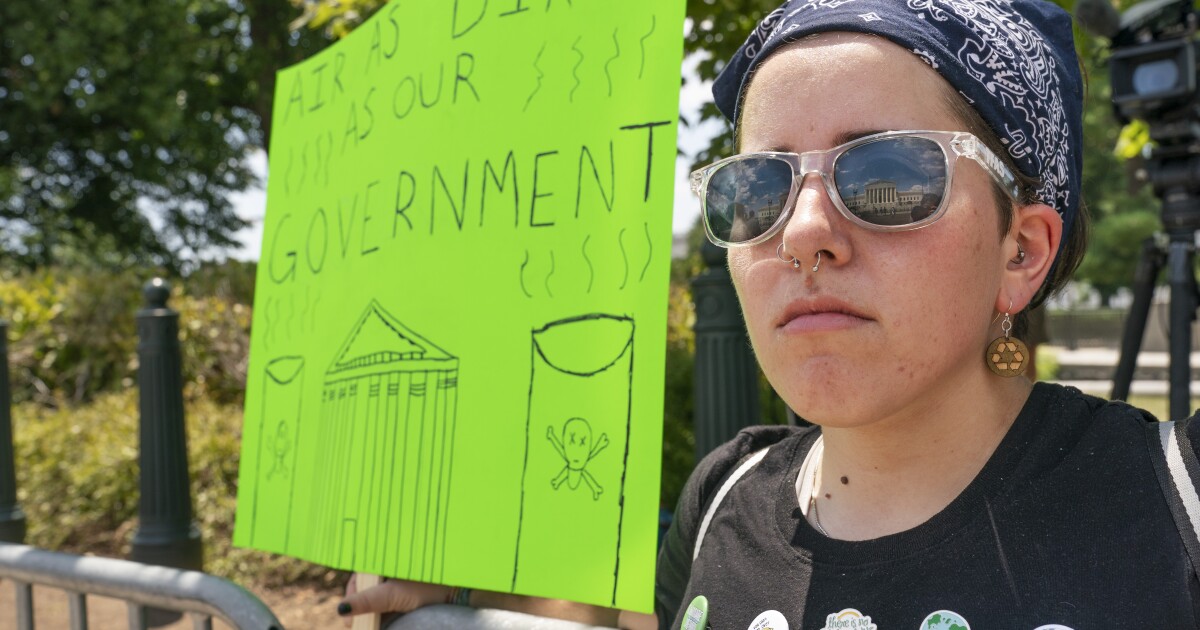

The climate hawks’ list of disappointments is growing longer as the global energy crisis and Europe’s imperative to cut ties with Russia send some of the world’s greenest governments into the embrace of fossil fuels.
The war in Ukraine has required President Joe Biden and other Western leaders who support aggressive green measures to make compromises to avoid energy shortages this winter and to ensure the overall security of their energy supplies, even while they maintain that it is necessary to replace fossil energy with renewables.
DAILY ON ENERGY: DEMOCRATS’ ROAD GETS ROCKIER THANKS TO SUPREME COURT
That means, at least for now, governments are seeking out more of the fossil fuels they would prefer to phase out quickly, leading to a major letdown for environmental interests.
Conclusions from the recent summit of the Group of Seven’s heads of state show that green policy preferences and, pointedly, the preferences of Biden and his fellow European leaders, are being outmatched by the demands of the global energy crisis.
The leaders’ newest Tuesday communique, which lays out how the members resolve to tackle major geopolitical problems, endorsed the public financing of natural gas projects in limited circumstances.
The communique emphasized the “exceptional” circumstances of the energy crisis and acknowledged “that investment in [the natural gas sector] is necessary in response to the current crisis.”
Italian Prime Minister Mario Draghi said separately that “large investments in gas infrastructure in developing countries and elsewhere” would be needed.
G-7 nations had a month earlier committed to ending direct public support for unabated fossil fuel projects internationally, meaning those unaccompanied by emissions-capturing technologies, by the end of this year. At the COP26 climate change conference in November, all of the leading industrial nations except Japan made a similar commitment.
The EU is scrambling to find ways to reduce its reliance on Russian natural gas, which over the last few years has provided more than a third of the bloc’s total gas imports, in an effort to cease funneling money to Russia and become less vulnerable to energy “blackmail.”
That effort includes seeking out new import partners, such as the United States and Qatar, that can provide Europe with more liquefied natural gas. But it also involves supporting new gas projects in the developing world, especially Africa.
The endorsement of gas sparked a backlash from green-aligned groups, which accused the G-7 of walking back a commitment it made just a month before and transgressing the Paris Agreement.
Kamila Godzinska, a London-based researcher at independent climate change think tank E3G, called the endorsement of gas infrastructure a “short-sighted and relatively ineffective way of boosting the resilience of global energy systems.”
Godzinska noted the general timeline for LNG terminal construction and delivery is between three and five years.
“These projects will have no effect on the crisis right now,” she said. “A focus on gas will detract attention and finance from cheaper and faster strategies that reduce gas demand and exposure to high prices. Those strategies include energy efficiency, electrification, and the expansion of renewables.”
The Biden administration and the G-7, as well as Europe more broadly, are pursuing all of those green strategies more aggressively in response to the energy crisis, but not to the exclusion of natural gas.
The G-7’s communique was one of the most explicit endorsements favoring new gas infrastructure since the war started, but it wasn’t the first action.
The Biden administration and the European Commission set up a joint task force in March with the mission of securing more LNG supplies for Europe. Biden committed to helping supply the European Union with several hundred billion cubic meters of U.S.-produced LNG through 2030, and the task force acknowledged that new infrastructure would be built to facilitate that.
Environmental groups have been especially critical of that move for “locking in” more fossil fuels and greenhouse gas emissions with new gas projects.
The European Commission also set aside 10 billion euros for investment in “limited additional gas infrastructure” with its newest energy platform, and the commission just issued a joint statement with energy giant Norway endorsing the continued exploration and production of oil and gas on the part of the non-EU member.
Romain Ioualalen, a global policy lead at Oil Change International, described the agreement as a “moral failure” and said the EU’s response to the war is “leading to a new dash for oil and gas around the world at a time when the world should be urgently phasing out fossil fuels.”
In addition, governments in Europe are turning more readily to coal, the dirtiest of fossil fuels, in order to conserve gas supplies ahead of winter.
In the U.S., frustration among environmental groups extends beyond Biden’s response to the energy crisis.
Biden pledged on the campaign trail to restrict drilling and leasing on federal lands and waters, and he sought to get the ball rolling by pausing all new leasing after taking office, but a federal court enjoined the leasing pause last summer. The administration is currently appealing the ruling.
The Biden administration has since scheduled and carried out multiple oil and gas lease sales, citing the court’s injunction, but its environmental constituencies say it hasn’t done enough to thwart new leasing.
“There’s nothing in that ruling that said that they had to restart new leasing now,” Nicole Ghio, a senior fossil fuel program manager at Friends of the Earth, told the Washington Examiner.
Ghio, whose group filed a lawsuit on Wednesday seeking to stop the Interior Department’s largest-yet onshore lease sale, said the administration’s increase in leasing royalty rates and its reductions of available acreage are inadequate reforms.
“We’re seeing Biden break his climate promise,” Ghio said. “It is very true that industry benefits from huge subsidies in the leasing programs, such as artificially low royalty rates. However, raising royalties does not actually address the climate impacts of the leasing program.”
CLICK HERE TO READ MORE FROM THE WASHINGTON EXAMINER
The Supreme Court also just defined new limits to the Environmental Protection Agency’s authority to regulate greenhouse gas emissions from power plants.
Environmental groups responded quickly by calling on Biden to wield his executive powers more aggressively to facilitate a faster transition away from fossil fuels and by calling on Congress to pass sweeping energy and climate legislation — something it has failed to do because of slim majorities, opposition from Republicans, and a lack of consensus among Senate Democrats.







